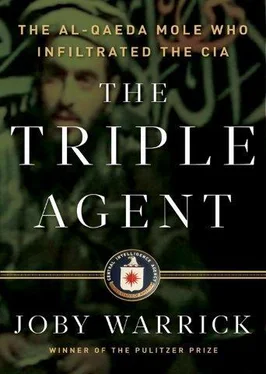Xe Services LLC, the company better known as Blackwater, sent its representatives to Virginia Beach, and DuPont, Washington, to meet with the wives of security guards Dane Paresi and Jeremy Wise. Dana Wise’s visitors showed up at her house as she was putting her son, Ethan, into the family truck for a quick errand. She sent the six-year-old to his room while she sat with the men in her living room. Before they left, she steeled herself for the task of breaking the news to her son.
Ethan was her child from an earlier marriage, but Jeremy had adopted him and loved him as his own. Once, when he was returning home from a long Iraq deployment, he decided to surprise Ethan by showing up at his school. It had been the happiest day in the young boy’s life.
Now there would be no more homecomings. With tears welling in her own eyes, Dana Wise scooped up her son and held him as the two sat on his bed surrounded by his toys and stuffed animals. Finally she worked up her nerve.
“Daddy’s gone,” she said softly.
Mindy Lou Paresi and daughter Santina had been relieved that evening to get a reassuring e-mail from Dane when they landed at Seattle’s airport after a holiday visit with family. It had been a rough trip, with endless lines and delays, and they were so exhausted when they arrived home that they left the suitcases packed and went to sleep. At 2:00 A.M. on New Year’s Eve, Mindy Lou was awakened by a knock. She looked out from an upstairs window to see three men at her door, one of them a police officer.
“Is Dane OK?” she called down.
“No, ma’am, he’s not.”
She let the men in, but she didn’t believe what they were saying. You’re wrong, I just got a text from him this evening , she said.
The Blackwater officials were startled, and one of them called the company to check again.
The reply was unambiguous. Dane Paresi was dead.
It would be nearly two days before Mindy Lou Paresi could allow herself to cry. She paced the apartment for hours that morning, folding laundry and making one phone call after another. Later she packed for the trip to Dover, Delaware, where she would meet the plane carrying the bodies from Afghanistan. She took her husband’s army uniform and boots out of the closet and put them into a separate bag. Dane would want to be buried in them.
On New Year’s Day she went to the airport, holding the bag with Dane’s uniform close to her on the car ride and in the airport terminal. At the security checkpoint, one of the attendants asked for the bag to put it through the metal detector. At first, she couldn’t bear to part with it. When she finally did, she broke down, sobbing uncontrollably.
Word of the bombing arrived in Jordan in the late evening. It came first to the intelligence service, the Mukhabarat, and then to the palace. An official with the royal court called Ali bin Zeid’s brothers and his wife and told them to gather at the family home in Amman.
After everyone was there, a delegation of top government officials assembled in front of the house. It included the king’s brother, Prince Ali bin al-Hussein, the prime minister, the Mukhabarat chief, and the commander of the Jordanian armed forces. At 9:30 P.M., they walked in a somber procession to the front door.
The door opened, and for several minutes no one—neither the dignitaries nor the family members—spoke. “Everyone knew,” said Ali bin Zeid’s brother, Hassan.
Khalil al-Balawi, father of the suicide bomber, got no such visit. But on the morning of New Year’s Eve, the phone rang at both the Balawi house and at the home of Defne Balawi’s parents in Istanbul. Both times the caller was a man who spoke in Arabic and did not give his name.
To Khalil al-Balawi, the caller sounded as though he were delivering good news. Humam had killed seven CIA officers in a martyrdom operation in Afghanistan, he said.
“Do not be sad,” the man said. “Allah willing, he is in the most exalted heavens.”
Khalil al-Balawi was surrounded by family members at the time, but he could not bring himself to mention the call—or perhaps even to believe it—until hours later, when the story had spread through the community that Humam, the doctor who lived in the neighborhood, was behind the suicide bombing that was dominating coverage on the Arabic news channel al-Jazeera. Relatives and family friends began calling, some with condolences and others with messages that sounded more akin to congratulations.
Khalil al-Balawi said little, but at one point he excused himself and went into his bedroom and took out his diary to try to make sense of the thoughts swirling through his brain.
“At the beginning of 2009 he was arrested and detained for three days by the Mukhabarat,” the old man wrote. “Then he was released. His father will attest that from that day on, a severe change came over him.
“It is this,” he wrote, “that caused me to lose my son.”
Langley, Virginia—January 2010
Sheikh Saeed al-Masri had slain a giant, and he was crowing.
“A successful epic,” the No. 3 al-Qaeda leader pronounced the suicide bombing in a rare public statement. He praised his star assassin, Humam al-Balawi, the “well-known preacher-writer … the migrant and the mujaid” who had penetrated the base of the terrorist group’s mortal enemy, the CIA.
Al-Masri’s message, posted on jihadist Web sites shortly after the suicide attack, stopped short of directly claiming responsibility, something that the old warrior knew would only increase the risk to himself. But he hinted at his knowledge of the intimate details of the plot, calling it a model of “patience, good planning and management.
“He detonated his fine, astonishing and well-designed explosive device, which was unseen by the eyes of those who do not believe,” al-Masri said. Then, addressing the dead bomber directly, he officially absolved Balawi of the doubts about him, questions that had lingered until the very end.
“You won, by the Lord of the Ka’aba, O Abu-Leila, God willing,” he said. “You were truthful, and you proved it.”
Al-Masri’s reaction was restrained in comparison to the Taliban leader Hakimullah Mehsud’s. Balawi’s former host had gone to the trouble of videotaping the Jordanian before his death, and so he had evidence of his ties to the suicide mission. But in the days after the attack, rival Taliban groups began to assert their own claims. One faction boasted that a disgruntled Afghan soldier was behind the bombing.
Hakimullah was so incensed that he began sending e-mails to Western journalists, using his real name.
“We claim the responsibility for the attack on the CIA in Afghanistan,” Hakimullah Mehsud wrote in the e-mails. The bombing was “revenge for the killing of Baitullah Mehsud and the killing of al-Qaeda’s Abdullah,” an apparent reference to Abdullah Said al-Libi.
The thirty-year-old Taliban leader also began to hint of a bold new phase for the Mehsud clan. The suicide bombing had been his group’s biggest operation outside its home base, and it gave a boost to Hakimullah Mehsud’s personal clout. He had been a local jihadist with parochial aspirations, but no longer. Like his slain cousin, he began to boast of plans to attack the West, starting with “America, the criminal state,” which he blamed for the death of Baitullah Mehsud.
“Our fidaeen have penetrated the terrorist America,” Hakimullah Mehsud brashly reported in a videotaped warning. “We will inflict extremely painful blows on the fanatic America.”
Balawi had predicted as much in the hours before his death. His sacrifice, he said in one of his final video recordings, was to be the “first of the revenge operations against the Americans and their drone teams, outside the Pakistani borders.”
Читать дальше












